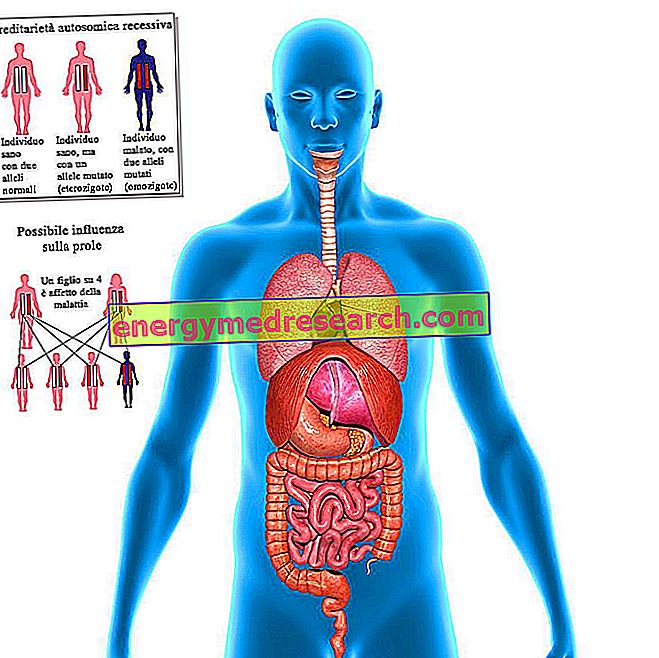Generality
Chronic pharyngitis is an inflammation of the pharynx (or, as many call it, of the throat), protracted over time and gradually appearing.

The typical symptoms of chronic pharyngitis are: pain in the throat, hoarseness, problems with swallowing, a sensation of a foreign body in the throat and the need to continually have to free the throat.
For an accurate diagnosis of chronic pharyngitis, endoscopy of the throat and larynx, a pharyngeal swab and otorhinolaryngological tests may be needed.
The treatment of chronic pharyngitis involves a treatment aimed at treating the causes and a series of symptomatic treatments.
What is chronic pharyngitis
Chronic pharyngitis is the persistent and gradual appearance inflammation of the pharynx.
The pharynx is the muscle-membranous duct, located in the back of the mouth (in the so-called throat ), which has the task of directing the food towards the esophagus .
Pharyngitis is the medical term that identifies the famous condition known as sore throat .
Types of chronic pharyngitis
Doctors recognize the existence of three types of chronic pharyngitis:
- The catarral type ( chronic catarral pharyngitis ), which is characterized by a certain degree of nasal congestion and by a slight swelling of the seromucinose glands (glands that produce mucus).
- The hypertrophic type ( chronic hypertrophic pharyngitis ), which is characterized, compared to the previous case, by a lower nasal congestion and a greater enlargement of the seromucinose glands.
- The atrophic type ( chronic atrophic pharyngitis ), which is typical of the elderly and produces a series of changes affecting the pharynx, including atrophy of the mucosa and muscles, pale and smooth appearance, and presence of adherent crusted material.
Chronic pharyngitis and acute pharyngitis
Chronic pharyngitis is opposed to the more common acute pharyngitis, that is to the inflammation of the pharynx of short duration and rapid appearance.
Epidemiology
Currently, there are no statistical studies concerning the incidence of chronic pharyngitis; the only certainty about this pharyngeal inflammatory process is that it is rarer than acute pharyngitis.
Causes
The main causes of chronic pharyngitis include:
- Gastroesophageal reflux disease . It is the medical condition characterized by the continuous repetition of the anomalous phenomenon of ascent towards the esophagus of gastric contents.
People suffering from gastroesophageal reflux disease are victims of frequent inflammations, not only of the esophagus (esophagitis), but also of the larynx (laryngitis) and pharynx; responsible for the aforementioned inflammatory processes are: the acidity characteristic of the gastric content and the extreme sensitivity of the esophagus, larynx and pharynx;
- Malignant tumors at the level of the pharyngolaryngeal tract or at the level of the oral cavity . Chronic pharyngitis is one of the typical symptoms (together with, for example, hoarseness, blood in the saliva and swallowing problems) of pharyngeal cancer (or throat cancer), laryngeal cancer and tongue cancer;
- Chronic tonsillitis . It is the chronic inflammation of the palatine tonsils. It may depend on several factors, including infectious agents;
- Chronic sinusitis . It is the chronic inflammation of the paranasal sinuses. It can be the result of numerous factors, including infectious agents;
- An untreated dental abscess ;
- The chronic inhalation of irritants . Polluted air, cigarette smoke and toxic fumes from some industrial plants contain irritants whose continuous exposure causes persistent inflammation of the pharynx;
- The protracted and excessive strain of the pharynx muscles . The prolonged use for professional reasons of the voice (it is for example the case of the singers) can fatigue the muscles of the pharynx, to the point of causing a chronic inflammation;
- Excessive dryness in the home or work environment . Often due to an incorrect use of heating systems, a too dry working or domestic environment, in terms of breathable air, and can inflam the pharynx chronically. The dryness of the air, in fact, causes nasal congestion and leads to breathing with the mouth;
- Breathing through the mouth, imposed by chronic conditions that are an obstacle to nasal breathing, such as turbinate hypertrophy, nasal polyps and chronic rhinitis.
Nasal breathing filters, humidifies and purifies the inspired air and this safeguards the health of the pharynx, larynx, trachea, etc. Breathing through the mouth, on the other hand, does not guarantee anything of the above and this favors the irritative and inflammatory processes of the pharynx, larynx, etc.
- Hypertrophy of the turbinates : it is the nasal suffering which consists in chronic and permanent swelling of the respiratory ciliate mucosa of the turbinates (small bony protrusions of the nasal septum covered by particular tissues).
From the swelling of the turbinates depends a reduction of the internal nasal space, fundamental for the normal process of nasal breathing;
- Nasal polyp: probably the result of inflammatory processes, nasal polyps are soft benign, multiple or solitary tumor growths, which grow on the nasal mucosa or inside the paranasal sinuses.
The presence of one or more nasal polyps can represent an obstacle, sometimes even considerable, to nasal breathing;
- Chronic rhinitis : it is an irritative and inflammatory process on the nasal mucosa, whose symptoms appear gradually, last several months and are of moderate severity.
Chronic rhinitis requires breathing through the mouth, because it causes a stuffy nose.
Who is at risk of chronic pharyngitis?
The people most at risk of chronic pharyngitis are: smokers, those who are victims of so-called passive smoking every day, singers by profession, those who breathe toxic and irritating substances on a daily basis, individuals with gastroesophageal reflux disease, people with chronic sinusitis or chronic tonsillitis, and people who spend a lot of time in too dry environments due to excessive heating.
Symptoms and complications
The typical symptoms and signs of chronic pharyngitis are:
- Throat pain, especially in the morning;
- Hoarseness and weak voice;
- Sensation of a foreign body or a lump in the throat;
- Need to constantly have to free the throat;
- Swallowing problems.
Signs of chronic pharyngitis
Dependent on the type of chronic pharyngitis underway, the typical signs of chronic pharyngeal inflammation are:
- Nasal congestion;
- Hypertrophy of the pharyngeal mucosa;
- Hypertrophy of the seromucinose glands of the throat;
- Hypertrophy of the so-called sub-epithelial throat follicles of the throat;
- Presence of reddish nodules on the posterior pharyngeal wall;
- Increased mucus secretion;
- Elongated and hypertrophic uvula.
Accompanying symptoms
The symptomatic picture of chronic pharyngitis also includes the symptoms related to the triggering cause (accompanying symptoms).
For example, in the presence of chronic pharyngitis due to gastroesophageal reflux disease, the symptomatology includes, in addition to typical disorders, problems such as repeated regurgitation and heartburn.
When should I go to the doctor?
The presence of a throat pain that lasts over time and shows no sign of abating, combined with symptoms such as hoarseness, swallowing problems, etc., is a valid reason to contact your doctor and request a follow-up visit.
Complications
The complications of chronic pharyngitis vary depending on the cause.
To understand, chronic pharyngitis due to throat cancer can lead to decidedly different (and much more serious) complications of chronic pharyngitis due to spending too much time in an environment that is too dry, due to excessive heating.
Diagnosis
The detection of chronic pharyngitis and its causes always begins with a thorough physical examination and a thorough medical history; therefore, based on what emerges from these two basic surveys, it can continue with:
- A pharyngeal swab;
- Blood tests;
- Otorhinolaryngology tests;
- An endoscopic examination of the throat and larynx;
- An MRI or CT scan related to the pharyngeal area;
Physical examination and medical history
Physical examination and anamnesis serve to establish with precision the symptomatological framework in place and why certain disorders are present (hence the causes of the symptoms).
For some cases of chronic pharyngitis they are sufficient for a definitive diagnosis, including also the identification of the triggering causes.
Pharyngeal swab and blood tests
The diagnostic doctor could prescribe a throat swab and blood tests, if he suspected, as a cause of chronic pharyngitis, some infection of the tonsils, sinuses or teeth.
Otorhinolaryngology tests
ENT tests are essential if the doctor suspects a condition such as turbinate hypertrophy.
Endoscopic examinations, magnetic resonance and CT
Endoscopic examinations, magnetic resonance imaging and CT in the pharyngeal area are fundamental instrumental tests in the diagnosis and study of all those cases of chronic pharyngitis due to throat, larynx or mouth tumors.
Therapy
The treatment of chronic pharyngitis involves, first of all, a treatment aimed at treating the triggering causes ( causal therapy ) and, secondly, a treatment aimed at alleviating the symptoms ( symptomatic therapy ).
Causal therapy
Causal therapy is essential for achieving healing; after all, it is unthinkable to cure a disease without treating its causes.
As can be guessed, causal therapy varies according to the factor that has caused and continues to cause chronic inflammation of the pharynx. This means, for example, that:
- The causal therapy of chronic pharyngitis due to gastroesophageal reflux disease consists of all those remedies and treatments (pharmacological, for less severe cases, and surgical, for the most serious cases) aimed at minimizing the number of daily episodes of ascent towards esophagus of gastric contents;
- The causal therapy of chronic pharyngitis due to throat cancer involves the elimination of the tumor mass, by radiotherapy, chemotherapy and / or surgery;
- The causal therapy of chronic pharyngitis due to cigarette smoking is to stop smoking;
- The causal therapy of a chronic pharyngitis resulting from daily frequentation of too dry environments is based on humidifying the aforementioned environments, in order to reduce the dryness level of the air
Readers will surely have noticed that, in some circumstances, causal therapy is not at all invasive and requires simple adjustments or a change in lifestyle; on the contrary, in other situations, it requires the use of invasive treatments (eg surgical interventions) or at least at risk of complications.
Symptomatic therapy
Symptomatic therapy is important for reducing the patient's suffering while undergoing causal therapy.
A classic symptomatic therapy of chronic pharyngitis may include:
- The rest of the voice;
- Gargle with solutions based on heated water and salt. They have an anti-inflammatory effect;
- Take anti-inflammatory and pain medication, such as paracetamol, ibuprofen or aspirin;
- Do not smoke (if the patient is a smoker) and do not frequent smokers;
- Do not visit dry or dusty areas.
Prevention
Chronic pharyngitis is a largely preventable condition; among the most important preventive measures against him, they certainly deserve a mention: not smoking, avoiding exposure to second-hand smoke, protecting yourself from the inhalation of certain toxic chemical substances, providing humidification for environments that are too dry and where you spend many hours of the day, and, finally, stick to a diet that preserves problems such as gastroesophageal reflux disease.
Prognosis
The prognosis for chronic pharyngitis depends on at least two factors, which are:
- The triggering cause. The prognosis of chronic pharyngitis has a greater chance of being benevolent when the causes triggering the condition are of slight clinical relevance (ie they are not serious);
- Timeliness of diagnosis and treatment. Especially in certain situations (eg, tumors or gastroesophageal reflux disease), early diagnosis and treatment of chronic pharyngitis are essential to hope for a better prognosis.



